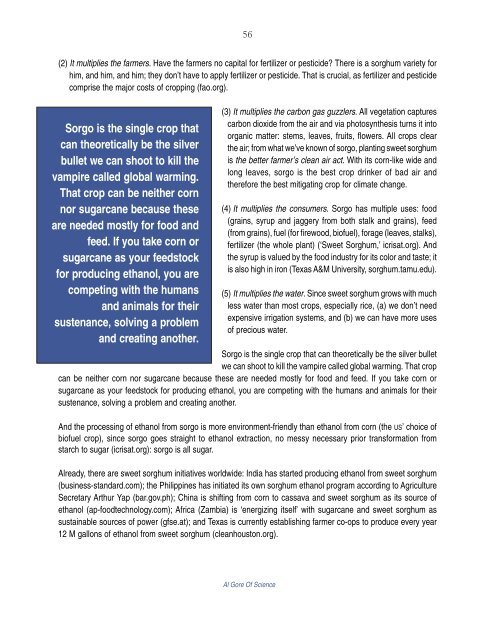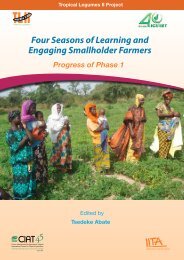Download - icrisat
Download - icrisat
Download - icrisat
You also want an ePaper? Increase the reach of your titles
YUMPU automatically turns print PDFs into web optimized ePapers that Google loves.
56<br />
(2) It multiplies the farmers. Have the farmers no capital for fertilizer or pesticide? There is a sorghum variety for<br />
him, and him, and him; they don’t have to apply fertilizer or pesticide. That is crucial, as fertilizer and pesticide<br />
comprise the major costs of cropping (fao.org).<br />
Sorgo is the single crop that<br />
can theoretically be the silver<br />
bullet we can shoot to kill the<br />
vampire called global warming.<br />
That crop can be neither corn<br />
nor sugarcane because these<br />
are needed mostly for food and<br />
feed. If you take corn or<br />
sugarcane as your feedstock<br />
for producing ethanol, you are<br />
competing with the humans<br />
and animals for their<br />
sustenance, solving a problem<br />
and creating another.<br />
(3) It multiplies the carbon gas guzzlers. All vegetation captures<br />
carbon dioxide from the air and via photosynthesis turns it into<br />
organic matter: stems, leaves, fruits, flowers. All crops clear<br />
the air; from what we’ve known of sorgo, planting sweet sorghum<br />
is the better farmer’s clean air act. With its corn-like wide and<br />
long leaves, sorgo is the best crop drinker of bad air and<br />
therefore the best mitigating crop for climate change.<br />
(4) It multiplies the consumers. Sorgo has multiple uses: food<br />
(grains, syrup and jaggery from both stalk and grains), feed<br />
(from grains), fuel (for firewood, biofuel), forage (leaves, stalks),<br />
fertilizer (the whole plant) (‘Sweet Sorghum,’ <strong>icrisat</strong>.org). And<br />
the syrup is valued by the food industry for its color and taste; it<br />
is also high in iron (Texas A&M University, sorghum.tamu.edu).<br />
(5) It multiplies the water. Since sweet sorghum grows with much<br />
less water than most crops, especially rice, (a) we don’t need<br />
expensive irrigation systems, and (b) we can have more uses<br />
of precious water.<br />
Sorgo is the single crop that can theoretically be the silver bullet<br />
we can shoot to kill the vampire called global warming. That crop<br />
can be neither corn nor sugarcane because these are needed mostly for food and feed. If you take corn or<br />
sugarcane as your feedstock for producing ethanol, you are competing with the humans and animals for their<br />
sustenance, solving a problem and creating another.<br />
And the processing of ethanol from sorgo is more environment-friendly than ethanol from corn (the US’ choice of<br />
biofuel crop), since sorgo goes straight to ethanol extraction, no messy necessary prior transformation from<br />
starch to sugar (<strong>icrisat</strong>.org): sorgo is all sugar.<br />
Already, there are sweet sorghum initiatives worldwide: India has started producing ethanol from sweet sorghum<br />
(business-standard.com); the Philippines has initiated its own sorghum ethanol program according to Agriculture<br />
Secretary Arthur Yap (bar.gov.ph); China is shifting from corn to cassava and sweet sorghum as its source of<br />
ethanol (ap-foodtechnology.com); Africa (Zambia) is ‘energizing itself’ with sugarcane and sweet sorghum as<br />
sustainable sources of power (gfse.at); and Texas is currently establishing farmer co-ops to produce every year<br />
12 M gallons of ethanol from sweet sorghum (cleanhouston.org).<br />
Al Gore Of Science

















